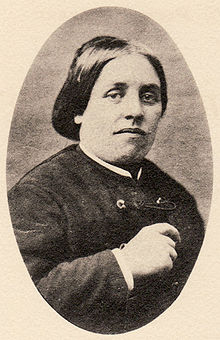Amélie Gex Contents Biography Selected works Bibliography References External links Navigation menu"Dian...
1835 births1883 deathsPeople from SavoieFrench poets19th-century poetsFranco-Provençal-language poets
La Chapelle-Blanche, SavoieChambérySavoyardFrenchFranco-Provençal (Arpitan)pen nameChambéryChalles-les-EauxKingdom of ItalyLiberalsCavourNapoleon III of FranceVictor Emmanuel IIRepublicanQueen of ShebaSolomonMont BlancAcademy of Savoy

Amélie Gex, ca. 1875
Amélie Rose Françoise Gex, (born October 24, 1835, La Chapelle-Blanche, Savoie, died June 16, 1883, Chambéry) was a Savoyard writer and poet who created works in French and Franco-Provençal (Arpitan). Until 1880, she published most of her writings under the pen name Dian de la Jeânna.
Contents
1 Biography
2 Selected works
3 Bibliography
4 References
5 External links
5.1 Works online
5.2 Other links
5.2.1 Text
5.2.2 Media files
Biography
Amélie Gex was the daughter of the physician [1] and winemaker [2] Marc-Samuel Gex. Her mother died when she was 4 years old. She first lived in Chambéry then Challes-les-Eaux with her grandmother. At fourteen, she moved back to La Chapelle-Blanche with her father.[3]
Upon the formation of the Kingdom of Italy in 1861, Gex, like many Liberals who preferred the Italian Cavour to Napoleon III of France, supported King Victor Emmanuel II. She later became Republican, and entered politics, writing speeches in dialect to better speak to rural voters.
Gex began writing during the years 1872-75. After the death of her father in 1876, she operated her family's estate, then returned to live in Chambéry, where she lived modestly.
In 1877, the Republican newspaper Le Père André [3] began publishing her poetry under the nom de plume Dian de la Jeânna ("John son of Jane"). She continued publishing under this name in Le Père André from March 1879 until May 1880, then in L'Indicateur savoisien from 1879 to 1882.[4] Her poems are devoted to vineyards, farmers and the Savoy. They evoke the harvest, threshing with a flail, and the cycles of nature that motivate people to work.
Gex also wrote short stories. In "Dit de la couleuvre" ("Tale of the Snake"), she reworks the story of the Queen of Sheba, who rode a flying serpent to marry Solomon. In "Dit du Château mort" ("Tale of Castle Death"), she evokes a pagan country castle near Mont Blanc haunted by a flaming sword turning in the air. Deciding that politics should give way to work, she also strove to write stories in French to expand her readership.
In 1882, she was honored by the Academy of Savoy for her work.[3]
She died of an illness in 1883.
Selected works

Amélie Gex
- 1878, Le long de l'An, chansons en patois savoyard, avec la traduction française en regard, Imp. C.-P. Ménard, Chambéry
- 1879, Reclans de Savoué, Les Echos de Savoie, Imp. C.-P. Ménard, Chambéry
- 1880, Poésies, Imp. C.-P. Ménard, Chambéry
- 1882, Lo cent ditons de Pierre d'Emo, Imp. C.-P. Ménard, Chambéry
- 1882, À une âme sincère, Imp. C.-P. Ménard, Chambéry
- 1885, Vieilles gens et vieilles choses : Histoire de ma rue de mon village, quatre contes
- 1894, Feuilles mortes, Imp. C.-P. Ménard, Chambéry
- 1898, Fables, Imp. C.-P. Ménard, Chambéry
Bibliography
- Charles Buet (1889), Le Parnasse contemporain savoyard, Thonon: Charles Buet & Impremerie de la Société Anonyme de l'Union Chablaisienne. (in French)
- Jolanda (1909), Il bardo della Savoia (Amélie Gex), Lugano: Casa editrice del « Coenobium ». (in Italian)
- F. Vermale (1923), Un Poète Savoyard, Amélie Gex (1835-1883). Notes biographiques et correspondance, Chambéry: Librairie Dardel, Chambéry. (in French)
- David Oscar (1926), Amélie Gex, Éditions revues du Lac d'Annecy. (in French)
- Augusta Abry (1942), Notre patois et nos poètes patoisants, Rumilly: Éd. J. Ducret (in French)
- Amis d'Amélie Gex (1955), Vieilles gens et vieilles choses : histoires de ma rue et de mon village. Amélie Gex, préf. Henry Bordeaux, Paris: Éd. Jean Portail (in French)
- Amélie Gex, trad. Armanda Grazini (1989), Vecchia gente e vecchie cose : storie della mia strada e del mio villaggio, Siena: Siena - universita. (in Italian)
- Philippe Terreaux (1990), La Savoie jadis et naguère : d'Amélie Gex à Henry Bordeaux, Geneva: Éditions Slatkine, 201 pages. (in French)
References
^ Fiche p.197, Dictionnaire d'Amboise. Pays de Savoie. Editions Amboise. 1989. 2e édition
^ Chez vous, à La Ravoire, n°9, 1979. Au sujet de l'origine des noms de rues", par Marcel Gianada. Il est bien précisé "médecin et viticulteur")
^ abc Fiche pp. 218-219 dans Jean-Marie Mayeur, Christian Sorrel (dir.), Yves-Marie Hilaire, La Savoie, Paris, Éditions Beauchesne, coll. Dictionnaire du monde religieux dans la France contemporaine, t. 8, 1996, 443 p.
^ Site Sabaudia.org
External links
Works online
"Dian de la Jeânna" (Amélie Gex, 1878), Le long de l'An : Chansons en payois sayoyard, BnF Gallica
"Dian de la Jeânna" (Amélie Gex, 1879), Reclans de Savoué, BnF Gallica
Amélie Gex (1880), Poésies, BnF Gallica
Amélie Gex (1885), Vieilles gens et vieilles choses : histoires de ma rue et de mon village, BnF Gallica
Other links
Text
Biography at Sabaudia.org (French)
Biographical note, Consulate General of Savoy (French)
Bibliographies, Amélie Gex at Librairie Le Beau Livre.com, list of complete works
Media files
Mediatheque Valais - Martigny, En Savoie: Amélie Gex et l'Institut Gardette de Lyon, Terrapon, Michel (1987), mpeg file (in French)
Mediatheque Valais - Martigny, Hommage à Amélie Gex, Terrapon, Michel (1986), mpeg file (in French)
Mediatheque Valais - Martigny, Léon l'Homme - Petit florilège francoprovençal, Terrapon, Michel (1993), mpeg file (in French)